

Sada-e-Watan Sydney ™
sadaewatan@gmail.com


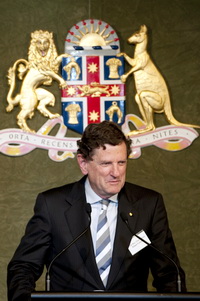
Chief Justice Robert French AC
The Law and Justice Foundation held its 2013 Justice Awards Presentation with Dinner at Parliament House NSW
Established in 1999, the Law and Justice Foundation of NSW’s annual Justice
Awards recognise the contributions that individuals and organisations have made
to improving access to justice in NSW, particularly for socially and
economically disadvantaged people.
The 2013 Justice Awards were presented on Monday 21 October 2013 at the
Strangers’ Dining Room Parliament House, Macquarie Street, Sydney
The Foundation was honoured to have The Hon. Robert French AC, Chief Justice of
the High Court of Australia
delivered the annual Law and Justice
Address.
Seven awards were presented on the evening:
Exclusive Coverage to Sada-e-Watan by The Hon.Shaoquett Moselmane MLC & Ms Maria Leonardis
The Hon. Shaoquett Moselmane wrote:
As a member of the Board of Governors of the Law and Justice Foundation to NSW, I was proud to witness the Muslim Women Support Centre (MWSC) Volunteers, One of seven highly deserving nominees, receive the Law and Justice Volunteer Award.
Last Monday Night, the law and Justice Foundation held its 2013 Justice Awards at Parliament House NSW, in the presence of 340 guests in the field of justice including The Hon Chief Justice Of the High Court of Australia, Robert French, president of the law Society, Mr John Dobson, The Hon Greg smith Attorney general and Minister for Justice and amongst others The Hon Sir Anthony Mason.
The Law and Justice Volunteer Award presented to the Volunteers of the Muslim Women Support Centre in Lakemba, for their dedication to providing an inclusive and culturally-appropriate service for women and children escaping domestic violence. The Volunteers provide mentoring, advocacy and education to assist women to become independent and rebuild their lives. And for those who, in a voluntary capacity, have demonstrated outstanding commitment to improving access to justice in NSW, particularly for socially and economically disadvantaged people. This may have been demonstrated in a range of activities over an extended period, or in a single significant activity.
This award was proudly sponsored and presented to the MWSC by the NSW Bar Association.
The MWSC volunteers support women and children escaping domestic violence to rebuild and regain control their lives. The team of 11 volunteers, some of whom were previous clients and have been with the centre between 5 to 17 years, remain strong and committed to providing a culturally specific service for Muslim women, and an inclusive service that assists domestic violence victims from other communities to access support services.
The volunteers provide a holistic service by helping clients in a range of ways such as taking them to appointment at Centrelink or Housing NS, advocating on their behalf, teaching them English and helping them to become independent. They also assist clients who have entered on a spousal visa to apply for Permanent Residency to remain in Australia. The support of volunteers assists the women to develop the confidence and skills to make informed decisions and move forward with their lives.
Through Sada-e-Watan, Congratulations to all volunteers and a special congratulations to the MWSC on a job well done.
Best Regards,
Shaoquett
The Hon. Shaoquett Moselmane MLC.Level 11, Room 1116.
Parliament of New South Wales
Parliament House
Macquarie St, Sydney NSW 2000 Australia
Congratulations to the Muslim Women Support Centre (MWSC) Volunteers - Winning Law and Justice Volunteer Awards
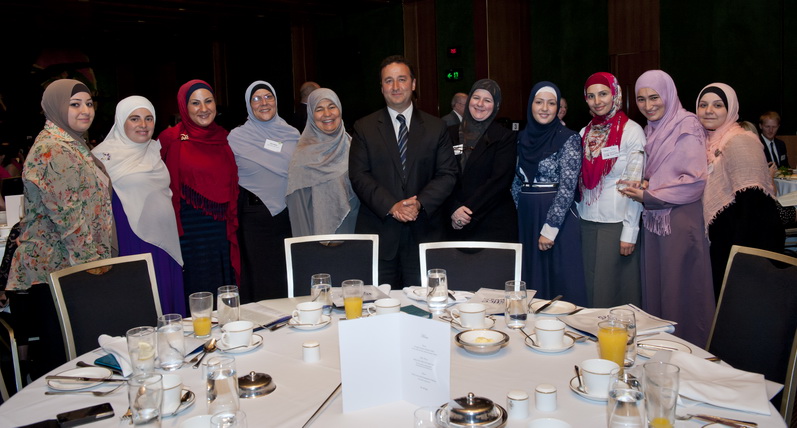
The Hon Shaoquett Moselmane MLC, Volunteers of the Muslim Women Support Centre and representatives from the Muslim Women Association.

Chief Justice of the High Court of Australia, The Honourable Chief Justice Robert French AC
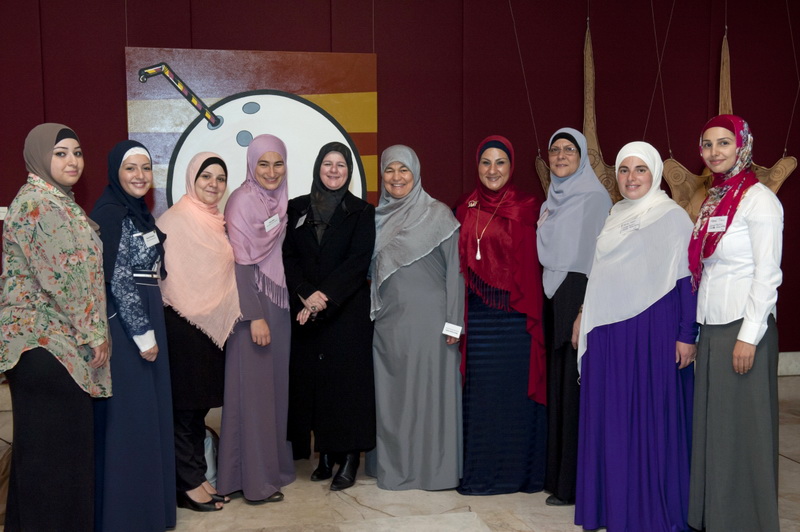
Volunteers of the Muslim Women Support Centre (winners of the Law and Justice Volunteer Award) and representatives from the Muslim Women Association.
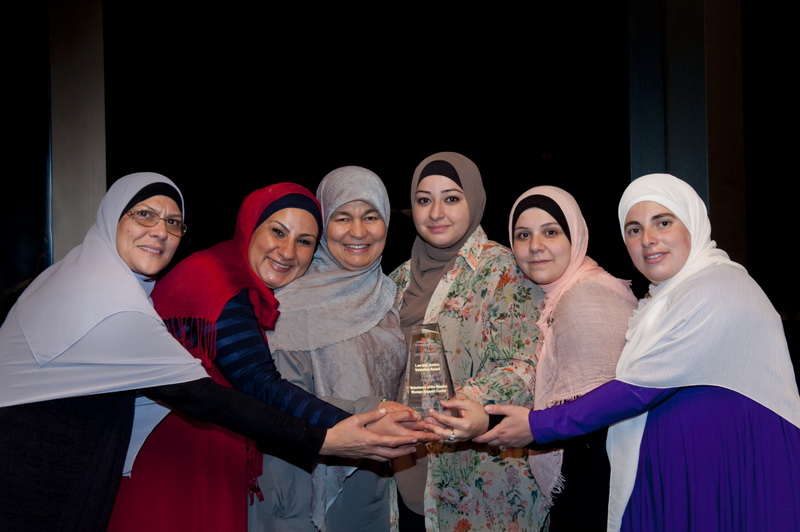
Representatives from the Muslim Women Association
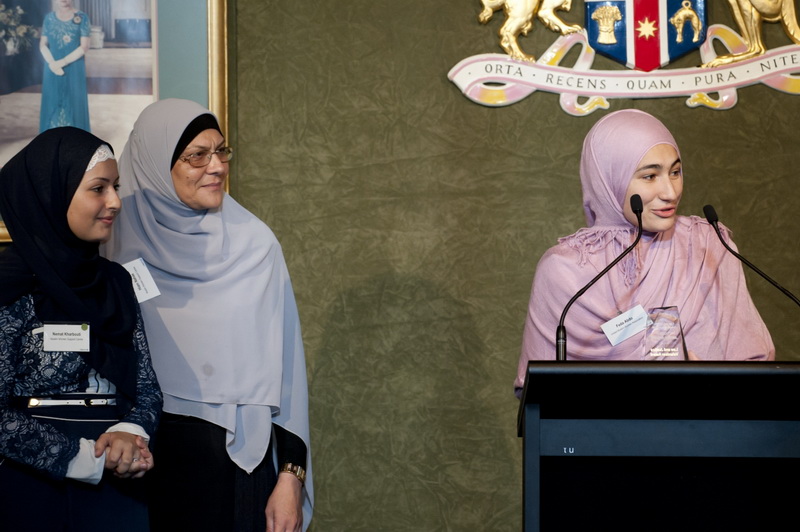
Feda Abdo from the Muslim Women Support Centre accepting the Law and Justice Volunteer Award on behalf of the Volunteers
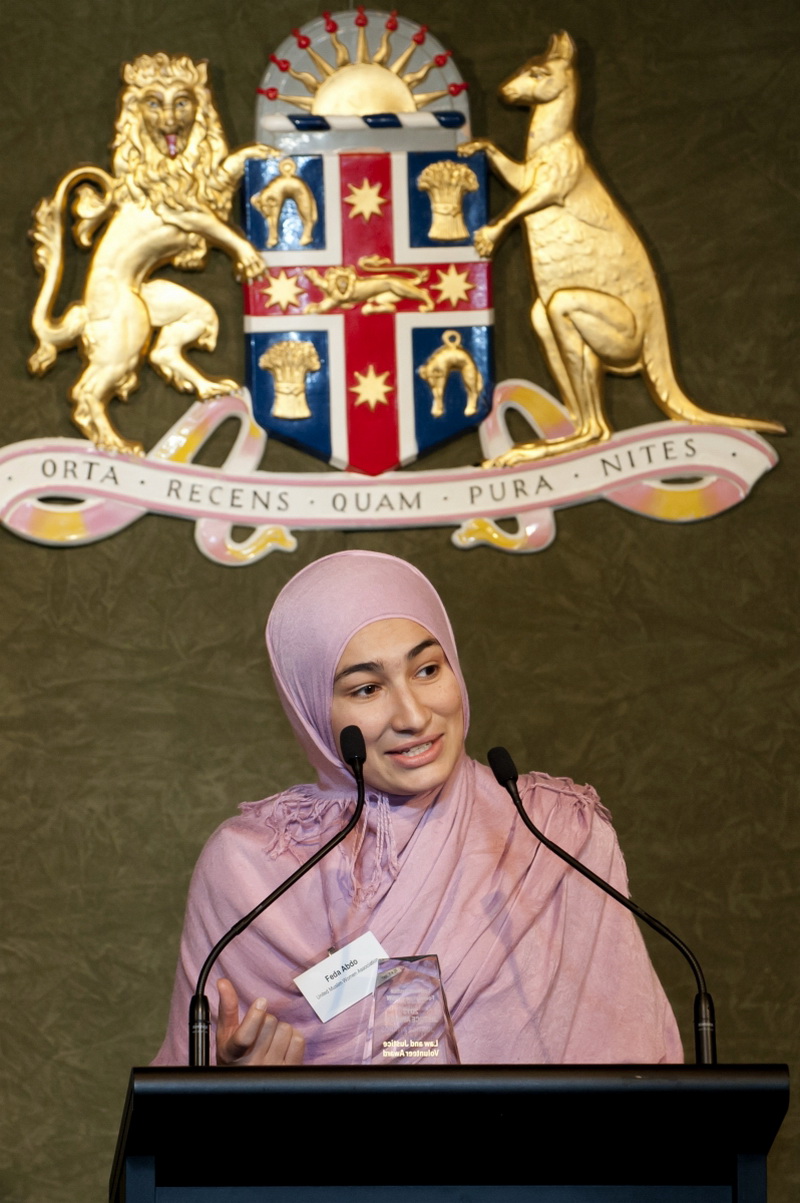
Feda Abdo from the Muslim Women Support Centre speaking at the dinner held at the New South Wales Parliament House


Chief Justice Hon.Robert French AC
Robert Shenton French
was appointed Chief Justice of the High Court of Australia in September 2008. At
the time of his appointment he was a judge of the Federal Court of Australia,
having been appointed to that office in November 1986.
He graduated from the University of Western Australia in science and law. He was
admitted in 1972 and practised as a barrister and solicitor in Western Australia
until 1983 when he went to the Western Australian Bar. From 1994 to 1998 he was
President of the National Native Title Tribunal. At the time of his appointment
he was an additional member of the Supreme Court of the Australian Capital
Territory and a member of the Supreme Court of Fiji. He was also a Deputy
President of the Australian Competition Tribunal and a part-time member of the
Australian Law Reform Commission. From 2001 to January 2005 he was president of
the Australian Association of Constitutional Law. Chief Justice French was
appointed a Companion in the General Division of the Order of Australia in 2010.
Transcript Speech of the Chief Justice of
the High Court of Australia, The Honourable Chief Justice Robert French AC
Justice in the Eye of the
Beholder
Law and Justice Foundation
Chief Justice Robert French AC
21 October 2013, Sydney
I thank the Law and Justice Foundation for the invitation to present the 2013 Law and Justice Address. The recognition at this dinner of the efforts of those who have been involved in improving access to justice for people across New South Wales is an event of importance and I am delighted to be part of it. As the efforts of the nominees and award winners demonstrate, giving effect to the aspiration to justice is hard work not least because it is often done in a setting in which there is disagreement about what justice requires. That leads to my topic–Justice in the Eye of the Beholder.
Justice may be thought of in many
ways. Ambrose Bierce the American author and satirist described it in his
Devil's Dictionary as:
A commodity which in a more or less adulterated condition the State sells to the
citizen as a reward for his allegiance, taxes and personal services.
While speaking of the devil, let me speak of Dante Alighieri's Divine Comedy
written in the 14th Century. It was translated in part, to faint critical
acclaim, by Sir Samuel Griffith and more recently to much greater acclaim by
Clive James. It offers us one understanding of divine justice at the end of the
medieval period.
In the first book, "The Inferno", Dante gives an account of a visit to the nine
circles of Hell where, guarded by the poet Virgil, he observes the punishments
applied to various classes of sinner many of whom seem to be Italians. The
divine justice depicted in The Inferno was imaginative and carefully nuanced.
All of it involved eternal torment. By way of example, those who practiced
simony, the sin of trafficking for profit in things spiritual, were inserted
head first into rock holes with only their feet and calves protruding. Eternal
flame was then applied to the soles of their feet.
More benign examples of divine justice in the Christian tradition can challenge
the modern reader. The New Testament parable of the workers in the vineyard
where those hired for the last one hour's work were paid as much as those who
had worked all day may seem at odds with contemporary notions of wage justice.
On the other hand it may be that it was really a story about the vineyard
owner's generosity which was not to be confined by concepts of justice. To that
extent the story is relevant to tonight's award ceremony. The awards are not so
much about "justice" in action. They recognise generous action in the cause of
access to justice. It is important to distinguish between justice, particularly
distributive justice and generosity. The former is important to the working of
any society. The latter achieves things beyond the reach of justice.
The idea of justice and just action is one which has been much debated by
philosophers, religionists, jurists, lawyers and judges. It cannot escape the
contemplation of any person who spares a thought for the state of his or her
society or how to conduct himself or herself in relation to other people. The
other people may be family members, friends and acquaintances, colleagues in the
workplace or the multitude of the nameless who suffer disadvantage visited upon
them by tragic circumstance or self-inflicted or a combination of both.
The insertion of a speech in the interval between main course and dessert is
often fatal to the enjoyment of dessert. It is not therefore the occasion for an
extended discourse on the idea of justice. Nevertheless it is appropriate to
acknowledge its complexity and its long evolution in human thought. Plato's
concept of "Dikaiosune" expounded in "The Republic" has frequently been
translated as "justice". His word however embraced a broad ethical notion
applicable to individuals and sometimes translated as "right" or
"righteousness", particularly in dealings with others. It was transposed into a
desired social structure in which everybody knew his or her place in a
hierarchy. On the top were the ruling classes or philosophers, then came the
warriors or defenders of society and at the bottom of the heap were farmers and
artisans. No doubt if you were a member of the ruling class you would have
thought it a fine arrangement. It is not a structure which our democratic
tradition and notions of equality of opportunity would accept as justly
structured.
Fast forwarding to the 20th and 21st Centuries leading works on theories of
justice have embodied notions of fairness. John Rawls in his "Theory of Justice"
proposed a minimum of two rules reflecting that idea in a just society:
• The liberty principle - each person should have an equal right to the most
extensive basic liberty compatible with similar liberty to others;
• The difference principle - social and economic inequalities are to be arranged
so that they are both:
(a) reasonably to be expected to be to everyone's advantage; and
(b) attached to positions and offices open to all.
The title of Ronald Dworkin's book "Justice for Hedgehogs" published in 2011
referred to a quote by the Greek poet Archilochus taken up by the philosopher
Isaiah Berlin who wrote:
The fox knows many things, but the hedgehog knows one big thing.
For Dworkin the big idea can crudely be stated as moral value providing an
objective underpinning for ideas of justice. He wrote:
We cannot defend a theory of justice without also defending, as part of the same
enterprise, a theory of moral objectivity. It is irresponsible to try to do
without such a theory.
On that basis he was prepared to state his belief that there are objective
truths about value and:
…that some institutions really are unjust and some acts really are wrong no
matter how many people believe that they are not.
If you accept that proposition then you accept the possibility that acting in
the interests of justice may involve swimming against the tide of public
opinion.
Professor DD Raphael wrote in the first chapter of his book "Concepts of
Justice", that Justice:
cannot be captured in a simple formula like "the rendering to each person of
what is his"…[a] traditional definition from Roman law.
The Roman law formulation does not cover the justice of criminal law or claims
made in the name of justice outside the sphere of law. Justice is a protean
concept. However a large part of its meaning as Professor Raphael writes is:
…pretty well captured in a more familiar term "fairness" which is not at all
obscure and is readily grasped even by young children.
The two ideas are nevertheless not co-extensive. Further we all know that what
is fair in a particular case may be a contestable and contested question. There
are some cases in which all that the law and Courts can do is fairly allocate
the burdens of unfairness–the slings and arrows of outrageous fortune which can
fall on anybody–for example where two innocent parties are affected by a third
party's fraud. Related to that is the question, to what extent should society
contribute its resources to offset the effects of one person's wrongs on an
innocent person. Criminal injury compensation is an example of a measure that
reflects a societal view that responses to the consequences of crime are not
just a matter of doing justice between the State and the offender or between the
offender and the victim, but also between the State and the victim. It is a
truism that crime is embedded in a social context. While, subject to the
principles of criminal responsibility, individuals must be held accountable for
their actions, those actions do not occur in a vacuum. There is a societal
dimension. In particular there are many cases in which one who was once a victim
whether of some form of abuse or gross disadvantage has become an offender. It
is no distraction from the concept of individual responsibility to recognise
that doing justice in the aftermath of a crime may involve measures to minimise
the harm caused to innocent parties by the offence–where mitigation is possible.
Nor is it any distraction from that concept to recognise that the State, in its
own interest, the interest of potential future victims, and the interests of the
offender should be prepared to direct significant resources to rehabilitation
where rehabilitation is possible.
Our legislators no doubt aspire to notions of justice and fairness in the laws
that they enact. There is a well-established tradition now of Parliamentary
Committees for the scrutiny of laws by reference to a number of standards
including, at the Commonwealth level, compliance with human rights standards.
But the enactment of a law does not settle the debate whether that law is just
or fair. Law in the end does not define justice nor tell us what is just in a
particular case. It may tell us what we must do or what we have a right to do.
Its limits may tell us what we are free to do. In many cases those statements
will reflect or embody what most people would agree are principles of common
morality. But that is not always so. What is lawful is not always right or just
or fair. And as I intimated earlier what is lawful and just and fair may be
exceeded by what is generous and altruistic and giving.
There are laws which attract debate because their proponents and their opponents
are at odds on what is fair or just in the class of case to which the law is
directed. The law governing the treatment of asylum seekers who are unlawful
non-citizens is one such class of law. Another is the category of law which
provides for the imposition of mandatory minimum sentences for particular
classes of offence. The proponents say that such laws meet urgent societal needs
to deal decisively with a particular kind of criminal activity and to establish
a high level of general deterrence. Their detractors may say that they lead to
absurdity and injustice in their application in cases to which the legislators
never imagined they would apply. As a general rule, "one size fits all" laws may
have the virtue of apparent clarity but can lead to outcomes in some cases which
most people would regard as unjust by ordinary standards of morality. There is
no bright line test by which such debates can be resolved. They often involve
judgments of degree about the priority of one legitimate social objective over
another and the proportionality of the measure to its objective. They are
debates of the kind regularly conducted in the democratic arena.
There is a difficulty with laws
which lack what I call "moral clarity". A law has moral clarity when it is easy
to understand what the law is good for. "Thou shalt not kill" is a command which
has moral clarity. Moral clarity is a concept closely connected to that of
legislative purpose. When a law has a clear purpose people affected by it have
some prospect of knowing what it is good for. The difficulty with a number of
our laws is that their complexity makes it hard to discern a particular
legislative purpose. That may be because the law gives effect to some political
compromise which seeks to strike a balance between conflicting interests.
The area of taxation law is a wonderful laboratory for excursions in purposeless
interpretation. The Goods and Services Tax Act and the old Sales Tax Act offer
examples. Much intellectual energy has been spent by Courts deciding whether
certain goods or services were inside or outside classifications attracting
different rates of tax. Was an office chair which could be used for household
purposes able to be classed as "a chair of a kind used for household purposes"?
More recently the question–is a mini-ciabatte a biscuit and hence GST free or
something else and hence not–occupied four Justices of the Federal Court, one at
first instance and three on appeal.
Intellectual property law is another area where moral confusion can arise.
Intellectual property statutes sometimes reflect the tensions between the
interests of owners and users. This is particularly so in the field of copyright
in the digital age. The difficulty in trying to attach a moral purpose to
intellectual property law is reflected in endeavours to devise convincing
anti-piracy messages for DVDs. In this connection different people have
different ideas of what is fair and just depending upon whether they are the
artists and studios who bring copyright works into existence or whether they are
users who might regard anything out in the internet as part of the public
domain. Messages equating copyright infringement with theft do not always
compute for these people. My favourite anti-piracy message is that which was
posted by an American performer, Louis CK, who made a video of one of his
performances for online purchase for $5.00. His message was:
Please bear in mind that I am not a company or a corporation. I am just some
guy. I have paid for the production and posting of this video with my own money.
I would like to be able to post more material to the fans in this way which
makes it cheaper for the buyer and more pleasant for me. So, please help me keep
this being a good idea. I can't stop you from torrenting; all I can do is
politely ask you to pay your five little dollars, enjoy the video and let other
people find it the same way.
That was a message which had moral clarity. The justice of the artist's position
was eloquently and clearly expressed.
It is sufficient to say that the complexity of law today can deprive it of moral
clarity and thus detach it from concepts of what is just and fair. To that
extent, the perceived legitimacy of the law may depend more upon the fact that
it has been enacted through democratic process than because people think it is a
good law. That may be sufficient for most. However it makes the job of securing
compliance more difficult.
The idea of justice remains a larger idea for most people than "justice
according to law"–a larger idea than the allocation of rights, duties,
liabilities and punishments and the award of legal remedies. There is a story of
a prominent legal practitioner in the Northern Territory in about 1911 whose
client said–"I want justice". The lawyer responded:
We can probably do better. I think we can win your case.
Can Courts deliver justice? The answer to that question is yes but there is a
limitation. The justice which the Courts can deliver must be justice according
to law not what the Judge thinks is a fair thing divorced from statute or legal
principle. Sometimes the law requires the Court to give a decision which many
would think of as unjust even though it is according to law. Sometimes the Court
will say so in order to direct attention to the need for reform of the law.
Sometimes apparent forensic failure will lead to a significant change in the
law. The failure by the plaintiffs in the Nabalco Case in 1971 to secure
recognition at common law of their customary native title was an important
factor in the convening of the Woodward Royal Commission. That Royal Commission
in turn recommended the establishment of a statutory land rights regime "as a
matter of simple justice". The Aboriginal Land Rights (Northern Territory) Act
1976 created a system of fee simple titles for traditional land owners in the
Northern Territory. It was a heavily litigated statute. There were no less than
14 cases in the High Court involving that Act prior to the High Court's decision
in Mabo in 1992. It may be that that litigation which involved a statute in
which the concept of traditional connection with country was embedded, helped to
prepare the High Court for its consideration of the issues which led to its
decision in Mabo.
Closely connected to basic concepts of justice in our society is the idea of the
Rule of Law.
The Rule of Law has a close connection with the notion of administrative
justice. That kind of justice is a thin concept but its significance is not to
be underestimated on that account. It provides the skeletal infrastructure
within which official power of any kind which may affect individuals must be
exercised. It involves at least the following elements:
1. Lawfulness–that official decisions are authorised by statute, prerogative or
constitution.
2. Rationality–that official decisions comply with the logical framework created
by the grant of power under which they are made.
3. Consistency–that official decisions apply legal rules consistently to all to
whom the rules apply allowing for different outcomes where there are relevant
differences between cases.
4. Fairness–that official decisions are reached fairly, that is, impartially in
fact and appearance and with a proper opportunity to persons affected to be
heard.
5. Good faith–official decisions must be made honestly and with conscientious
attention to the task required of the decision maker–this also may be seen as an
aspect of rationality in decision making.
Those criteria are also applicable to official decisions in the exercise of
judicial power. Without that skeletal framework of public justice reflecting the
Rule of Law, the implementation of more substantive concepts is unlikely.
Justice has many faces, many dimensions. What it means in particular cases is
contestable and often contested. Justice according to law provides a measure of
justice but not complete justice. Justice itself, however expansively it is
defined, does not embrace the generosity of spirit and the commitment to
providing access to justice which are recognised in tonight's awards ceremony.
Thank you for inviting me to speak to you.